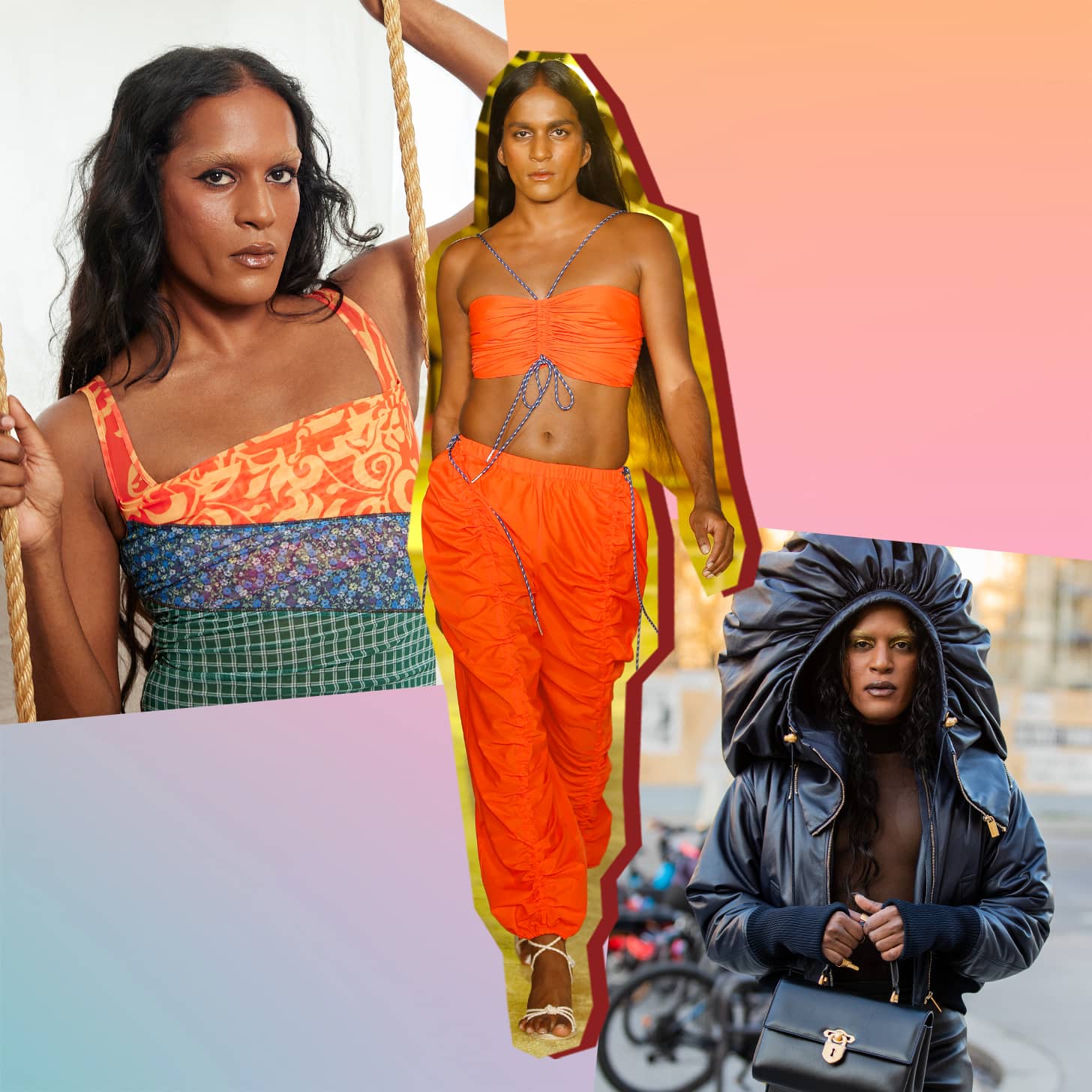
- POPSUGAR Australia
- Celebrity
- Richie Shazam on Pride, Found Families, and the Power of Truth-Telling
Richie Shazam on Pride, Found Families, and the Power of Truth-Telling

POPSUGAR Presents Pride Revolution – a series celebrating the beauty, brilliance, and resilience of the queer community. LGBTQ+ Pride has always been revolutionary in nature, pushing society’s boundaries to be more accepting, more affirming, and more inclusive. As Pride grows to permeate pop culture, revolution is as necessary as ever to ensure that safety, equality, equity, and inclusivity remain at the centre.
“Pride is a riot,” Richie Shazam says. “It is a protest. And through art and expression, that’s the ultimate way of showcasing that.” Designer muse, image-maker, performance artist, and activist, Shazam is honouring the legacy of pioneering trans women of colour. As trans and nonconforming narratives are starting to move to the forefront, she’s doing everything in her power to make sure they remain there.
In anticipation of her upcoming directorial film debut, Shazam caught up with POPSUGAR for a kiki. But first, we had to discuss her outfit: a yellow brocade toile corset two-piece set, coordinating yellow platform boots, and slicked-back hair. “We’re serving fashion and face today,” she tells us. We would expect nothing less from the front-row staple.
“Pride is a riot. It is a protest. And through art and expression, that’s the ultimate way of showcasing that.”
As a pioneering fixture in the fashion space, her résumé is the stuff of legend. First, there’s her bold and high-spirited strut down the runway for the likes of Vivienne Westwood, Staud, Sandy Liang, and Luar. When she’s not gracing the catwalk, she’s sitting front row in full head-to-toe designer looks at Prada, Diesel, Jean-Paul Gaultier, and Schiaparelli, sometimes alongside famous friends like Julia Fox.
She’s starring in international campaigns for Calvin Klein, Miu Miu, and Marc Jacobs, posing in their artful designs with her signature withering glare. And Shazam is a photographer as well, lensing covers for publications like Interview and 10 magazines. Now, she’s stepping behind the camera again to direct her first short film, “Savitree,” premiering at the Tribeca Film Festival in partnership with Converse. The film acts as an autobiographical insight into Shazam’s journey from adolescence to now, surrounded by her found family.
The self-described “NYC Bollywood Princess” has made a career as a multidisciplinary storyteller. Shazam often inserts herself into her work, taking on characters and evoking fantastical narratives in the wheelhouse of femme artists like Lorraine O’Grady, Cindy Sherman, and Vaginal Davis.
“For me, my escapism was built on fantasy,” she says. “We have such a beautiful way of fantasizing and envisioning our worlds and futures because we’re constantly given this short timeframe of being on this earth.” Transgender people are twice as likely to die as cisgender people, according to a long-running study published in The Lancet Diabetes & Endocrinology. “Our life is cut in half, and that just forces us to live each day to the fullest.”
As a Jamaica, Queens, native, Shazam says her NYC upbringing inspired her to find the camera and her inner aesthete. “New York City is the ultimate backdrop,” she says. “I was born and raised in New York and from Jamaica, Queens, as a first-generation young person just trying to find my way. It was very crucial in showing me alternate realities of how I can exist.”
But she acknowledges that her journey wasn’t without its challenges. “Obviously, there’s a lot of chaos, and it’s not been easy. It’s very turbulent, a lot of hard work and perseverance, and not just from the work/creation aspect, but just in identity politics, building oneself – it’s truly gruesome. I’ve had to dig really deep to find the tools necessary to exist, and NYC, in part, helped with that.”
As millennials tend to do, we somehow segue to astrological signs. “I’m an Aquarius, and we love the dramatics,” she says. I tell her I’m a Taurus, and she immediately lights up. “Oh my God, amazing! My mom was a Taurus. My mama raised me, and we had such a beautiful, special relationship.” Shazam talks a lot about her relationship with her late mother, Savitree, which is also the title of her upcoming film. Savitree’s passing closed the chapter on Shazam’s connection to her nuclear family.
What she’s saying is all too familiar for many queer folks, whose nuclear families, unfortunately, aren’t equipped to affirm, see, and support them. “I’ve gotten to where I am today through the power of found family. They’ve given me the tools – unconditional love, support, affection, compassion – to be myself, and that wasn’t something I had growing up in my nuclear family. They did not have the tools in order to give me that.” This lack of support and marginalization can mean life or death for many, leaving them vulnerable to the harms of homelessness, suicide, and crime. That’s where found families come in.
The history of chosen families is a legacy. Think queer literary circles, like the friendship between James Baldwin and Lorraine Hansberry; ballroom houses, which were created to foster safe spaces and operate as chosen families; the trailblazing Satyrs Motorcycle Club; and the onscreen, offscreen family of “Pose” actors Michaela Jaé, Angelica Ross, Hailie Sahar, Dominique Jackson, and Indya Moore. LGBTQ+ folks have been finding their people – their found families – for decades.
“There’s such beauty and power in giving queer artists agency to tell their own stories. Brands must continue to put us in positions of power and let us be the creative directors.”
Shazam speaks fondly of her found family. “You know when you meet someone, and your eyes just land, and you’re instantly like, ‘I see you, and you see me,’ and don’t have to say anything? That’s what I have with my girls upon meeting each other,” she says. “It was a sensation that I’ve never felt before.”
As we’re currently in the middle of Pride Month, Shazam has thoughts about the annual tradition. “It’s so intense, as the commodification of the entire month, but I think that we have a lot of work to do, like the world at large.”
To echo Shazam’s sentiments, Pride is increasingly becoming more commodified, and while visibility and allyship are essential, it’s important to make sure the essence of Pride stays true to its revolutionary beginnings: on the shoulders of trans activists of colour.
Pride is celebrated in commemoration of the Stonewall Riots; on June 28, 1969, New York City police raided the Stonewall Inn, a queer club in Greenwich Village, NYC, and key figures Marsha P. Johnson, Sylvia Rivera, and other queer foremothers resisted. These demonstrations led to Pride as we know it today.
Representation is important, but representation without equity falls short. “I think there’s such beauty and power in giving queer artists agency to tell their own stories,” Shazam says. “Brands and organizations must continue to put us in positions of power and let us tell our stories. Let us be the creative directors.”
While on the topic of Pride, Shazam wants to call attention to a critical detail: “I tell all the dolls, ‘Don’t do anything for free in the month of Pride, period. If someone wants you there, you need a bag.'”
As an epidemic of anti-trans violence continues to plague trans and gender-diverse communities, ensuring their safety is also of paramount importance. “Our safety, security, and ensuring that we are taken care of is A) most important and B) should be a priority.”
Shazam also shared advice for young queer, trans, and nonconforming folks navigating the roads to their truths. “You must find your community, your girls,” she says. “I think it’s about finding those spaces that affirm your identity and leaning onto those queer pockets of your society, wherever you live.”
Aside from seeking out safe queer spaces, she recommends “focusing on self-affirming things to build up your self-esteem and confidence and exploring your faith, creativity, and the sides of yourself that you may fear.”
“Everyone has their own journey, with their own set of challenges, but having a bit of patience in knowing that it’s going to get better and leaning on your tribe for support – it’s so important.”
Shazam’s short film, “Savitree,” in collaboration with Converse, is set to premiere at the 2022 Tribeca Film Festival on June 16. The film will be screened at select events throughout Pride Month and the rest of the summer before releasing to the public later this year.
Related: 20 LGBTQ+ Couples Share the Stories Behind Their Engagement Rings


